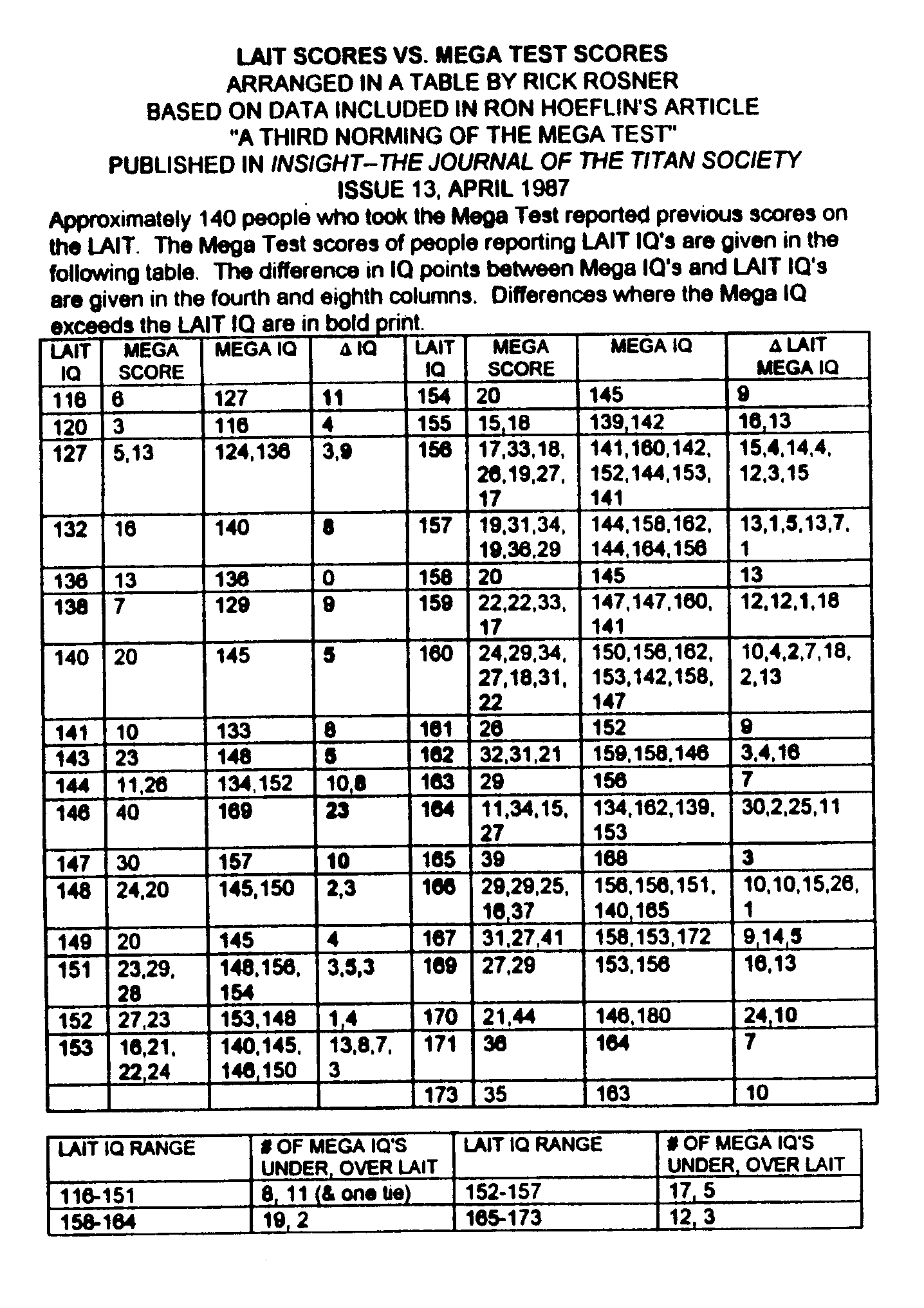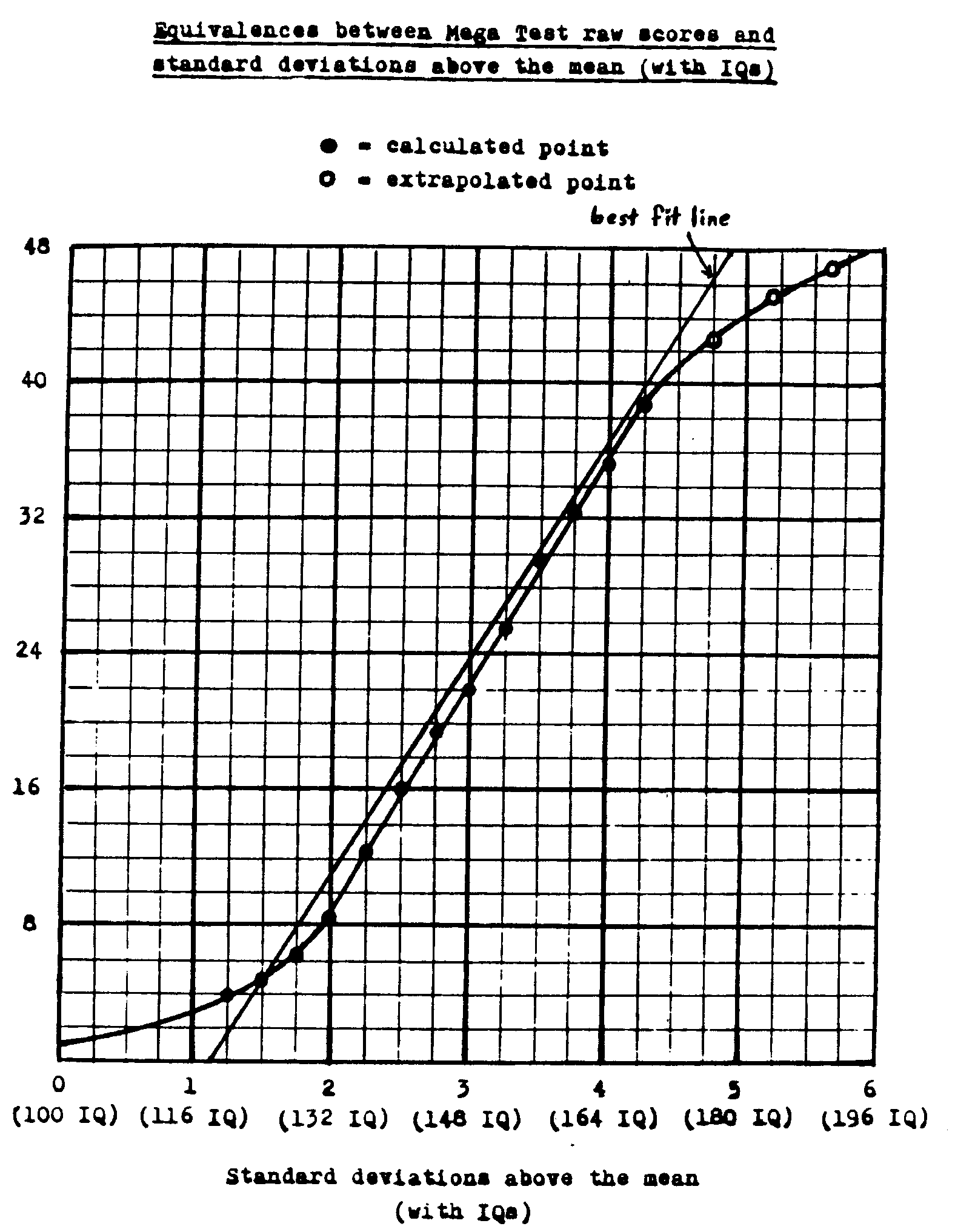
1. In the nearly six years I've been editing Noesis, no one has applied for membership on the basis of a score on a Langdon test. It's just oo hard to score at the Mega level on them, mostly because of test ceilings that are too close to the Mega cutoff, unlike Hoeflin's tests, which have ceflings more than a dozen IQ points above the Mega cutoff. So any norming inflation on a Langdon test hasn't affected Mega membership since at least as far back as 1990.
2. In the early to mid-80's, people were admitted to Mega on the basis of scores on a variety of tests. In addition, people were admitted to the Titan Society, the precursor to the Noetic Society, which is now merged into Mega, at the 1 in 100,000 level. But, at the time the Titan Society was formed, the I in 100K cutoff score was 43 on the Mega Test, and the 1 in a million cutoff was 46. Hoeflin's subsequent renormings, based on now information from ETS and on new norming techniques, eventually lowered the 1 in a million cutoff score to 43.
What I'm trying to indicate is that over the long history of Mega, people have been admitted based on a variety of tests and at an exclusivity level as low as 1 in 100K. When we suggested a recertification after the merger of the Mega and the Noetic Societies, people were immediately and justifiably indignant, and it became a provision of the merger that anyone who had qualified for any of the sociefies now merged into Mega with a good faith effort would be grandfathered into Mega in perpetuity. (You have to pay dues to be an active member, but any former member could return to active membership by doing so.)
3. Members' test performances do not discemably correlate with the quality of their submissions. That is, I am not able to conclude anything about members' intelligence or test performances by their submissions. I can't say, "Hmmm. This article seems to be from someone who got a 43 Instead of a 47 on the Mega, or maybe was admitted in 1985 on the basis of an IQ test taken in childhood." Old members (to the extent they're around) do not drag down the level of discourse. (Not that the average level of discourse is so high anyway.)
4. I'm putting this sloppy article right after Jeff Ward's comment that "...strung doubts have indeed been raised about the validity of Kevin's norming, I personally don't think that his norming is seriously in question. However, I haven't really read all of Maxim's mathematical attacks on Langdon. I have thoroughly read the latest--"How Inflationary is LAIT?"--and disagree with most of its conclusions, both because of personal sentiments--that Langdon's tests have kicked my butt and that knowing Langdon for seven years, I find him erudite and pretty reasonable--and statistical/procedural objections.
My statistical/procedural objections are:
A. My guess is that the people scoring highest on the LAIT would tend to have lower scores on other tests because of regression to the mean and that among the many people who took the LAIT and didn't get the top 17 scores, you'd find a few who got higher scores on other IQ test. I dunno. When norming their tests, how did Hoeflin and Langdon deal with regression to the mean?
B. There is what I call the Savant factor--because Marilyn vos Savant has no reason to take any more IQ tests. At best, she could only max a test and still get a score far below her childhood Stanford-Binet or her 48 [actually 46 --KL] on the Mega. At worst, she could make a couple careless errors and get a score of 170. Why would she, or anyone who's already scored super-high, want to take a test with a ceiling of 176 or 180? (Plus, Marilyn vos Savant has a life--she has better stuff to do than take tests.) So I figure the very highest scorers on other tests wouldn't take the LAIT. Many of the LAIT's high scorers would be close-but-no-cigar scorers on other tests. Hey, if you gave somebody 10 different IQ tests, and they got a 108, four scores in the 110's, four scores in the l20's, and a 134, what do you think that person will claim as his IQ?
C. I started writing this In July. Now it's October. For two months I didn't work on it. I don't remember what point C was supposed to be, and I now strongly suspect points A and B are stupid. But I'm sick of this subject. I want to finally got these issues out, and I don't want to spend the time and mental effort to figure out whether points A and B have any bearing or legitimacy. (Ach, my crummy hard drive makes crashing noises every two minutes. I donl have autosave, so I'm closing this doc after every sentence. Now the baby's awake--she's gonna want to play on the computer.) Back in July, I looked at a bunch of LAIT vs. Mega Test scores--check out the following table--and was surprised to see that people reporting LAIT scores did tend to achieve lower IQ scores on the Mega. Is there an issue here? I doubt it, but check out the numbers for yourselves.
New point C--the overconfidence factor. The LAIT is a multiple-choice test. Doing a thorough job on it might take 40 hours of work. (Question to Kevin Langdon: How many hours of work do you think it takes to do a good job on the LAIT?) Hoeflin's Mega Test isn't multiple choice, and a thorough job on it takes 60 to 100 hours of work. It's possible that people thought they'd do well on the Mega simply by virtue of having done well on the LAIT and didn't put sufficient effort Into the Mega. I did exactly that on the second Langdon test I took; I figured, "Hey, I did pretty well on the LAIT, I should do well on this other test of his. I forget which one it was.) I gave it insufficient attention, made careless errors, and got an IQ score 12 points lower on the second test. I don't tell people that the lower score is my IQ.)
New point D. Did some people exaggerate their LAIT scams when reporting them to Hoeflin? I doubt many did, because, if many did, one or two would have been goofy enough to report scores above the LAIT's ceiling, and I don't see any scores like that.
Anyway, this is old news and not pertinent to the composition of the Mega Society, but I'm sure the debate will continue.

